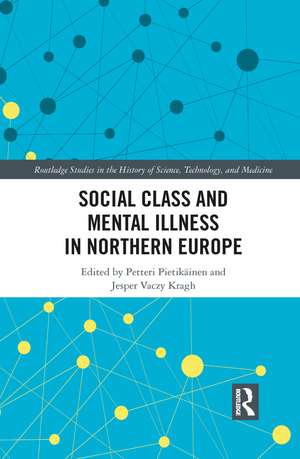Social Class and Mental Illness in Northern Europe: Routledge Studies in the History of Science, Technology and Medicine
Editat de Petteri Pietikäinen, Jesper Kraghen Limba Engleză Paperback – 30 iun 2021
| Toate formatele și edițiile | Preț | Express |
|---|---|---|
| Paperback (1) | 384.27 lei 6-8 săpt. | |
| Taylor & Francis – 30 iun 2021 | 384.27 lei 6-8 săpt. | |
| Hardback (1) | 888.68 lei 6-8 săpt. | |
| Taylor & Francis – 15 oct 2019 | 888.68 lei 6-8 săpt. |
Din seria Routledge Studies in the History of Science, Technology and Medicine
- 5%
 Preț: 976.66 lei
Preț: 976.66 lei -
 Preț: 311.41 lei
Preț: 311.41 lei - 5%
 Preț: 296.12 lei
Preț: 296.12 lei - 18%
 Preț: 1017.91 lei
Preț: 1017.91 lei -
 Preț: 383.33 lei
Preț: 383.33 lei -
 Preț: 419.50 lei
Preț: 419.50 lei -
 Preț: 392.67 lei
Preț: 392.67 lei -
 Preț: 412.41 lei
Preț: 412.41 lei - 17%
 Preț: 259.07 lei
Preț: 259.07 lei - 5%
 Preț: 1158.84 lei
Preț: 1158.84 lei - 31%
 Preț: 764.20 lei
Preț: 764.20 lei -
 Preț: 436.02 lei
Preț: 436.02 lei - 18%
 Preț: 1000.27 lei
Preț: 1000.27 lei - 18%
 Preț: 1061.06 lei
Preț: 1061.06 lei -
 Preț: 450.40 lei
Preț: 450.40 lei - 16%
 Preț: 260.33 lei
Preț: 260.33 lei - 18%
 Preț: 949.60 lei
Preț: 949.60 lei -
 Preț: 389.11 lei
Preț: 389.11 lei -
 Preț: 287.07 lei
Preț: 287.07 lei - 31%
 Preț: 741.36 lei
Preț: 741.36 lei -
 Preț: 488.92 lei
Preț: 488.92 lei -
 Preț: 279.94 lei
Preț: 279.94 lei - 22%
 Preț: 327.96 lei
Preț: 327.96 lei - 16%
 Preț: 325.34 lei
Preț: 325.34 lei - 21%
 Preț: 905.45 lei
Preț: 905.45 lei - 17%
 Preț: 271.02 lei
Preț: 271.02 lei - 18%
 Preț: 888.68 lei
Preț: 888.68 lei - 25%
 Preț: 324.29 lei
Preț: 324.29 lei -
 Preț: 492.96 lei
Preț: 492.96 lei - 5%
 Preț: 1158.89 lei
Preț: 1158.89 lei -
 Preț: 413.37 lei
Preț: 413.37 lei -
 Preț: 489.26 lei
Preț: 489.26 lei - 20%
 Preț: 259.98 lei
Preț: 259.98 lei - 31%
 Preț: 766.49 lei
Preț: 766.49 lei -
 Preț: 416.22 lei
Preț: 416.22 lei - 30%
 Preț: 768.10 lei
Preț: 768.10 lei - 38%
 Preț: 772.79 lei
Preț: 772.79 lei
Preț: 384.27 lei
Nou
Puncte Express: 576
Preț estimativ în valută:
73.55€ • 79.92$ • 61.82£
73.55€ • 79.92$ • 61.82£
Carte tipărită la comandă
Livrare economică 21 aprilie-05 mai
Preluare comenzi: 021 569.72.76
Specificații
ISBN-13: 9781032088143
ISBN-10: 1032088141
Pagini: 228
Dimensiuni: 156 x 234 x 12 mm
Greutate: 0.33 kg
Ediția:1
Editura: Taylor & Francis
Colecția Routledge
Seria Routledge Studies in the History of Science, Technology and Medicine
Locul publicării:Oxford, United Kingdom
ISBN-10: 1032088141
Pagini: 228
Dimensiuni: 156 x 234 x 12 mm
Greutate: 0.33 kg
Ediția:1
Editura: Taylor & Francis
Colecția Routledge
Seria Routledge Studies in the History of Science, Technology and Medicine
Locul publicării:Oxford, United Kingdom
Public țintă
PostgraduateCuprins
1 .Introduction (Petteri Pietikainen and Jesper Vaczy Kragh) Part One: Psychiatry, Mental Hospitals and Social Class 2. Class and mental health in post-war Britain (Vicky Long) 3. Pity the poor patient: Small farmers, rural labourers and industrial workers in a mental hospital in Northern Finland, 1925-1970 (Petteri Pietikainen) 4. Different background, different cure? How the patients’ socioeconomic status affected Finnish institutional psychiatry from the 1930s to the 1960s (Anu Rissanen) 5. After patient murder. Asylum psychiatry in the four German occupation zones, 1945-1955 (Maike Rotzoll) 6. Radical reformist psychiatry and the class awareness in Finland in the 1960s and 1970s (Mikko Myllykangas and Katariina Parhi) Part Two: Minorities, Deviants and Psychopaths 7. The Romani minority in Norwegian forensic hospitals, 1895-1940 (Øyvind Thomassen) 8. Femininity and social class in forensic psychiatric assessments in Norway, 1938-1969 (Maria Antonie Sæther) 9. Social class and drug addiction in European psychiatry, 1860-1955 (Jesper Vaczy Kragh) 10. Psychopaths, ‘querulants’ and class in 1930s Sweden: On controversial diagnoses, money, norms and networks (Annika Berg) Part Three: Social Class and Children: War, Nervousness and Hyperactivity 11. ‘Nervous children’ - medical notions of degeneration, mental health and social class in Denmark and England, ca 1900-1945 (Jennie Sejr Junghans) 12. Children changing places. Encountering the ‘war child’ in post-war Finland (Tuomas Laine-Frigren) 13. Challenging the biomedical narrative of ADHD: Social class, race, and hyperactivity in the US and the UK, ca. 1950-2010 (Marie Reinholdt)
Notă biografică
Petteri Pietikäinen is Professor of the History of Science and Ideas at the University of Oulu, Finland
Jesper Vaczy Kragh is principle investigator at Psychiatry Region Zealand and a Fellow at CoRe, the University of Copenhagen, Denmark
Jesper Vaczy Kragh is principle investigator at Psychiatry Region Zealand and a Fellow at CoRe, the University of Copenhagen, Denmark
Descriere
This book examines the relationship between social class and mental illness in Northern Europe during the 20th century.















